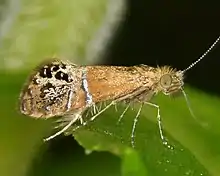Adela ridingsella
Adela ridingsella, Ridings' fairy moth, is a moth of the Adelidae family or fairy longhorn moths. It was described by James Brackenridge Clemens[3] in 1864. It is widespread in eastern North America, from Nova Scotia, Ontario, Quebec and Maine to Pennsylvania and the mountains of North Carolina.
| Ridings' fairy moth | |
|---|---|
 | |
| Scientific classification | |
| Domain: | Eukaryota |
| Kingdom: | Animalia |
| Phylum: | Arthropoda |
| Class: | Insecta |
| Order: | Lepidoptera |
| Family: | Adelidae |
| Genus: | Adela |
| Species: | A. ridingsella |
| Binomial name | |
| Adela ridingsella | |
| Synonyms | |
The basal half of the forewings are brownish-orange with silvery median and apical bands. The distal half of the wing has a patch of large black spots near the inner margin and small black spots at the middle of the wing. The hindwings are uniformly brownish-orange.[4] Adults are on wing from June to July.
Larvae found in petiole galls on Parthenocissus quinquefolia might belong to this species. The larvae later formed external cases.[5]
References
- Adela at funet
- "Adela ridingsella– Ridings' Fairy Moth". Moth Photographers Group. Retrieved May 21, 2012.
- "Proceedings of the Entomological Society of Washington". 5–7. 1903: 181.
{{cite journal}}: Cite journal requires|journal=(help) - "Adela ridingsella". Bug Guide. Retrieved May 21, 2012.
- Jerry A. Powell (1969). "A Synopsis of Nearctic Adelid Moths, with Descriptions of New Species (Incurvariidae)" (PDF). Journal of the Lepidopterists' Society. Berkeley, California: University of California. 211.
This article is issued from Wikipedia. The text is licensed under Creative Commons - Attribution - Sharealike. Additional terms may apply for the media files.